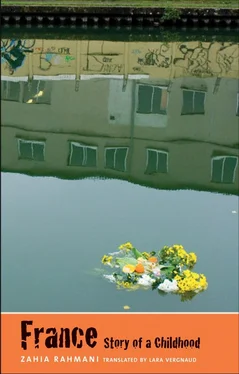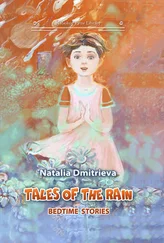Maman, you still believe. You hope I will accept this life that has been chosen for me. But I refuse to give in. I reject the rules you want your children to respect. There is no letup, you, my father, everyone wears me out. It’s agony. First I shut out your words and suspicions. Then the strain drives me to challenge obligation with violence. I’m in constant pain, it erupts at the slightest touch, submerging me. I scream angrily at all of you. Expulsing my manic thoughts, I slam my head against the mirror, glimpsing the damage inflicted by my father. I condemn myself. You become frightened. You tell me that while the upheavals of recent history are partly at fault, the ones your ancestors recounted to you weren’t any gentler.
Yet my own upheavals, here in this village, don’t look like anyone else’s. You use kindness to banish them. Fearful of losing me, you want to be by my side in spite of everything. Sympathetic, you tell me about your life as if confiding in an ally. I hear it all, your childhood, your father’s love, your children, your sorrows, and your hopes. You make yourself my friend. You love me. You need to see me live. I listen to you. I say nothing. You tell me my death will be the end of you. I don’t know why, but I can’t admit defeat. I want to convince you that I’m right no matter the cost, and no longer have to beg. For that I will wear you out. I will go so far as to sleep outside, in the cold, under your window, in order to hear your maternal sobs beseeching me to come in. I refuse, letting myself grow colder, unaware of the limits of my extreme need for freedom. I demand that you make my father give me a key.
You came and got me a dozen times. I refuse to let it end.
You begin with your family stories. Pleasant and beautiful, they transport me. Sometimes too far. When they beggar belief, I sigh and interrupt you. I ask who is the son, grandson, grandfather, mother, daughter, or great-great-grandchild of whom? Countless times, impatient, unable to bear your legends any longer, I implore you, “Please, stop. All this means nothing to me, I can’t take it anymore. I don’t care about these people, I don’t know them.” But you keep trying. Using fables to charm me, you tell me these harmless characters, even dead and distant, will not fade away. I can’t deny our lineage, you say. I need to understand it, this knowledge will help me. I care little about the truth behind your stories but I want to understand your stubbornness in telling me them. I won’t know until later that by showing me my origins, and leading me on this quest, you are prolonging my life.

In France, we emerged from a void, a provenance without ancestors, and this denial was the price of our admission. Out there I have no past. No history. No family. My father and mother don’t matter. They aren’t good for anything. They’re alive, breathing, but without value. Their presence is calculated only in terms of the cost for society. “They weren’t raised right!” As a child, this is inflicted on me, and I swallow it whole. “Shame on them. They have nothing to pass down. They haven’t left their mark anywhere. They’ve never done anything good. Shame on them, the clumsy, stammering fools.” I live surrounded by this. There’s no one who tells me, “I love you, I know who you are.” I’m barely even allowed on the sidewalks. They have their dogs stand guard. Fifty meters along the path to school, all the children from one family mock my fear of their leashed German shepherd. “Bite her, bite her.” One time they let him go. He sinks his teeth into my knee. They hide so they can listen to me scream.

Nothing but silence. I’m an outcast. I live in rural France, where they’re encountering foreigners for the first time. It’s a first at my school as well. I really don’t want to go. Not even via a different path. Too many pebbles in my face. Thrown by some girls. The teacher asks to see me. He comes to our home and tells me, “I’m sorry . . . sorry for what they did to you.” He looks through my notebooks and says, “Good work, very good, you’re ahead of us. This is where I am.”
I go to school. The teacher has me sit in the front row. He says to the class, “Here’s a new friend for you all. She’s from the city. We’re going to see if you’re smarter than she is.” He knows I’m the best. I’m touched. I like and respect him.
In junior high I’m reunited with my brother. He’s in ninth grade. This is when it starts again. I don’t belong here. I have to be careful because I can easily slip through the cracks. They hit me. It’s normal with children, but they add that I should leave. My hair, my eyes, maybe. I don’t know. On the playground, I cling to my older brother. I look back, but there’s nothing good to hold on to. Only faces turning away. What they want is for me not to speak to them. Afraid I might contaminate them, in case they start to like me. No one comes over to my house. Later, my classmates’ parents will tell me, “In the beginning—1973, 1974, 1975, etc.—we thought you ate lions. Crocodiles and giraffes even.” What’s to the townspeople’s credit is that they told me. They will add, “We were afraid you were going to steal from us.” Then, “Afraid for our chickens.” And, “Afraid of your crimes . . .” Suspected of everything. And for everything. No one ever says “the Algerian War.” I don’t know anything about it, nothing, and yet we’re here and we’re frightening . . . And throughout this time, not an ally in sight. Not one.
I hear, “Let them go back to where they came from.”
I understand, “Reject them and you’re with us!”
It’s a dead end, my parents don’t have a country to go back to. Dripping contempt, people repeat, “We don’t want them. There are too many!” Too many what? Me? You? Arabs? What does it mean? The language, the people, the country? I don’t know. Back there? Ahead, behind, nothing but black holes.
“Their parents weren’t raised right!”
Your kid returns from school and her home is a void. I drop off my things. I take off. Everything I don’t understand is catching up with me. I see my parents, and I run away from them. I tell myself I am not theirs, I need to find out who I am. For that, I have to be free. I tear myself away, I erase all trace of them. What’s more, I want them to suffer the same pain that’s destroying my life. Faced with such betrayal, people give up. But my parents become impassive, they wait. Reminding me of the parable about the vein of marble, which, sandwiched between two layers, can be extracted only by the sweat of man.
My mother refuses to back down a single inch. She doesn’t want to fail.
“You deny me, you ignore me? Well, while I wait I’ll talk to the birds . . .”
It’s important to recognize the harm being done to the child through mere words. The insult to his or her way of life delivered in good conscience. “They’re marginalized . . . We’re concerned about them . . . Their religion can’t . . . They are . . . The thing is, the poverty in which they . . . We can’t accommodate them . . .” And as for the child, what’s there to support him or her? What’s he or she left with? Do the parents really have nothing? Nothing noble? Nothing the child can respect?
My mother isn’t allowed the act of transmission—to pass on all that she possesses.

In France, I endure, I resist. An entire society mobilizes against me, aware of the harm being done. Crushing my future to better rejoice in my failure, it’s working toward my disappearance.
Читать дальше



![Джеффри Дивер - Where the Evidence Lies [A Lincoln Rhyme Short Story]](/books/403782/dzheffri-diver-where-the-evidence-lies-a-lincoln-r-thumb.webp)
![Джеймс Чейз - The Mirror in Room 22 [short story]](/books/421068/dzhejms-chejz-the-mirror-in-room-22-short-story-thumb.webp)








